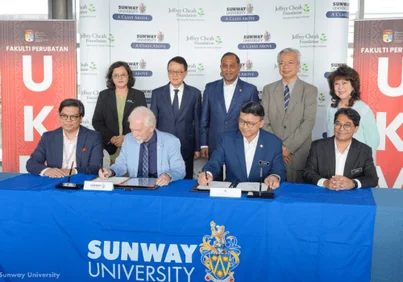Asia Pacific University of Technology and Innovation (APU)
Kuala Lumpur, Malaysia

Well-known for Computer Science, IT and Engineering courses

Graduates enjoy 99% employment rate

MBA by Central Bank of Malaysia in collaboration with the Massachusetts Institute of Technology (MIT)

University specializing in producing educators and pedagogists


No Results Found
See all courses for
Discover your eligibility based on your current education qualifications
 University
for You
University
for You


 in Malaysia
in Malaysia

Our team of advisors is ready to support you at every step of your study abroad journey.

See programs that best match your eligibility and aspirations.

We'll get you to the right place to start your application.

Get help after application, all the way to your first day at university.
Our services are 100% free for students like you because we're funded by universities.
Speak to Study AdvisorKuala Lumpur, Malaysia
Malaysia
Hong Kong

Kuala Lumpur, Malaysia
Malaysia
Subang Jaya, Malaysia
Malaysia
Shah Alam, Malaysia
Malaysia
Malaysia
Subang Jaya, Malaysia
Malaysia
Malaysia
Kota Kinabalu, Malaysia
Malaysia
Malaysia
Kuala Lumpur, Malaysia
Shah Alam, Malaysia
Subang Jaya, Malaysia
Malaysia
Kota Kinabalu, Malaysia
George Town, Malaysia
Malaysia
Educity Iskandar, Malaysia
Malaysia
Subang Jaya, Malaysia
Subang Jaya, Malaysia
George Town, Malaysia
Petaling Jaya, Malaysia
Shah Alam, Malaysia
Subang Jaya, Malaysia
Malaysia
Kuala Lumpur, Malaysia
Malaysia
Subang Jaya, Malaysia
Malaysia
Malaysia
Malaysia
Kota Kinabalu, Malaysia
Educity Iskandar, Malaysia
Malaysia
Malaysia
Subang Jaya, Malaysia
Malaysia
Shah Alam, Malaysia
Subang Jaya, Malaysia
Malaysia
Malaysia
Petaling Jaya, Malaysia
Malaysia
Malaysia
George Town, Malaysia
Malaysia
Malaysia
Shah Alam, Malaysia
Malaysia
Kuala Lumpur, Malaysia
Subang Jaya, Malaysia
Subang Jaya, Malaysia
Malaysia
Malaysia
George Town, Malaysia
Malaysia
Malaysia
Malaysia
Malaysia
Malaysia
Kota Kinabalu, Malaysia




This website uses cookies to ensure you get the best experience. By using this site, you acknowledge that you have read and understand our Cookie Policy , Privacy Statement and Terms & Conditions .
Current currency: MYR - RM
Current site: EasyUni Malaysia





